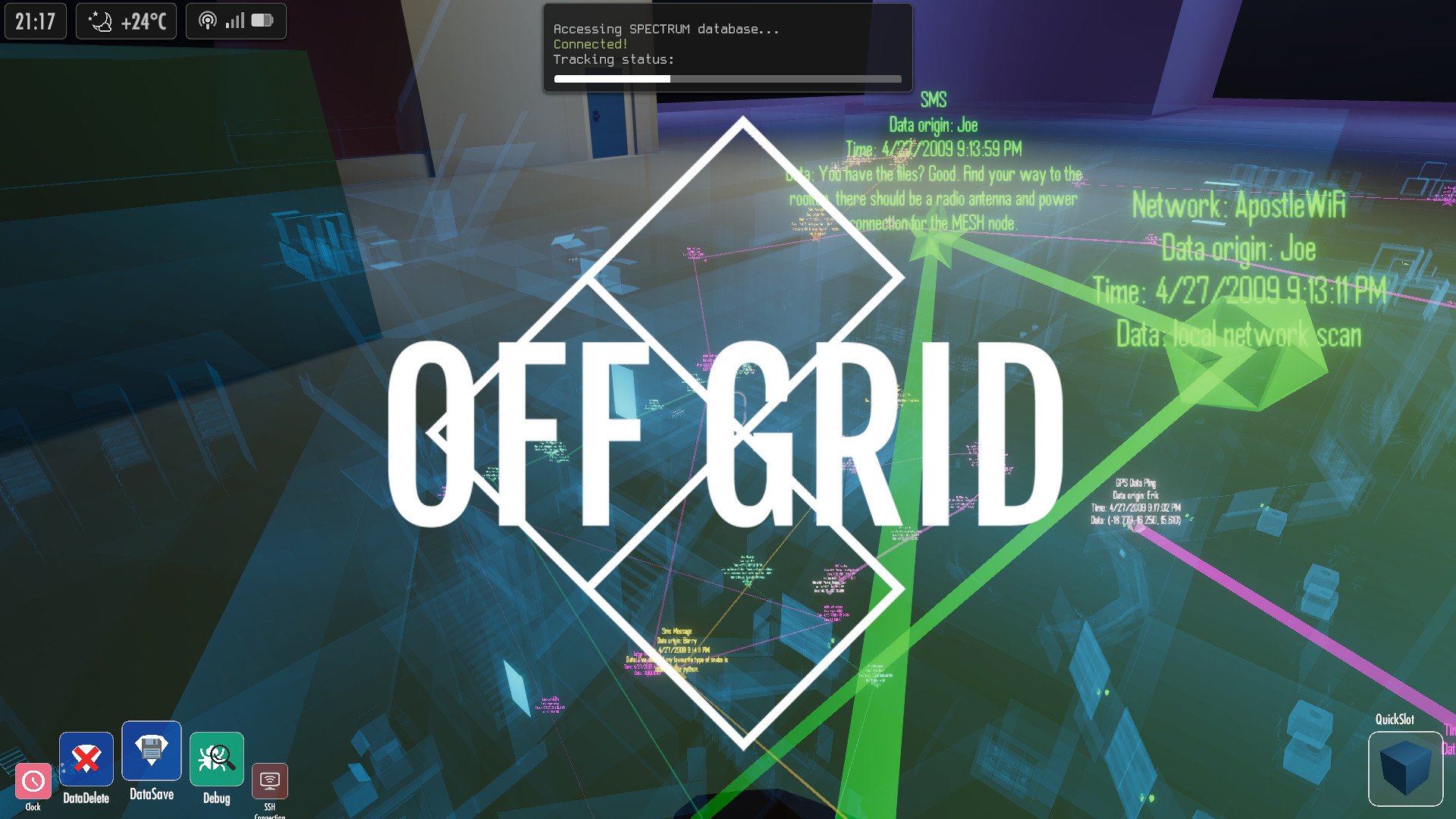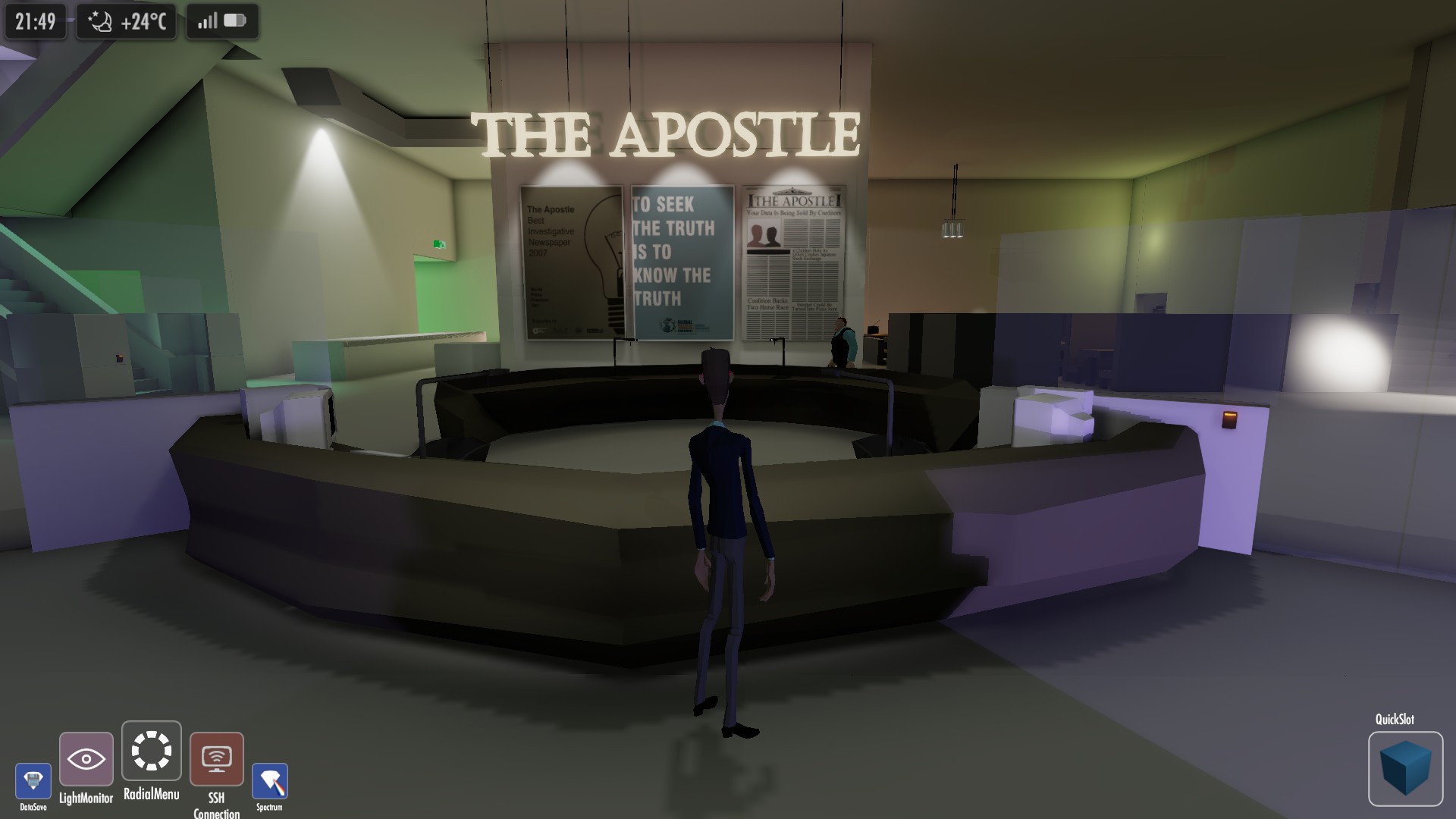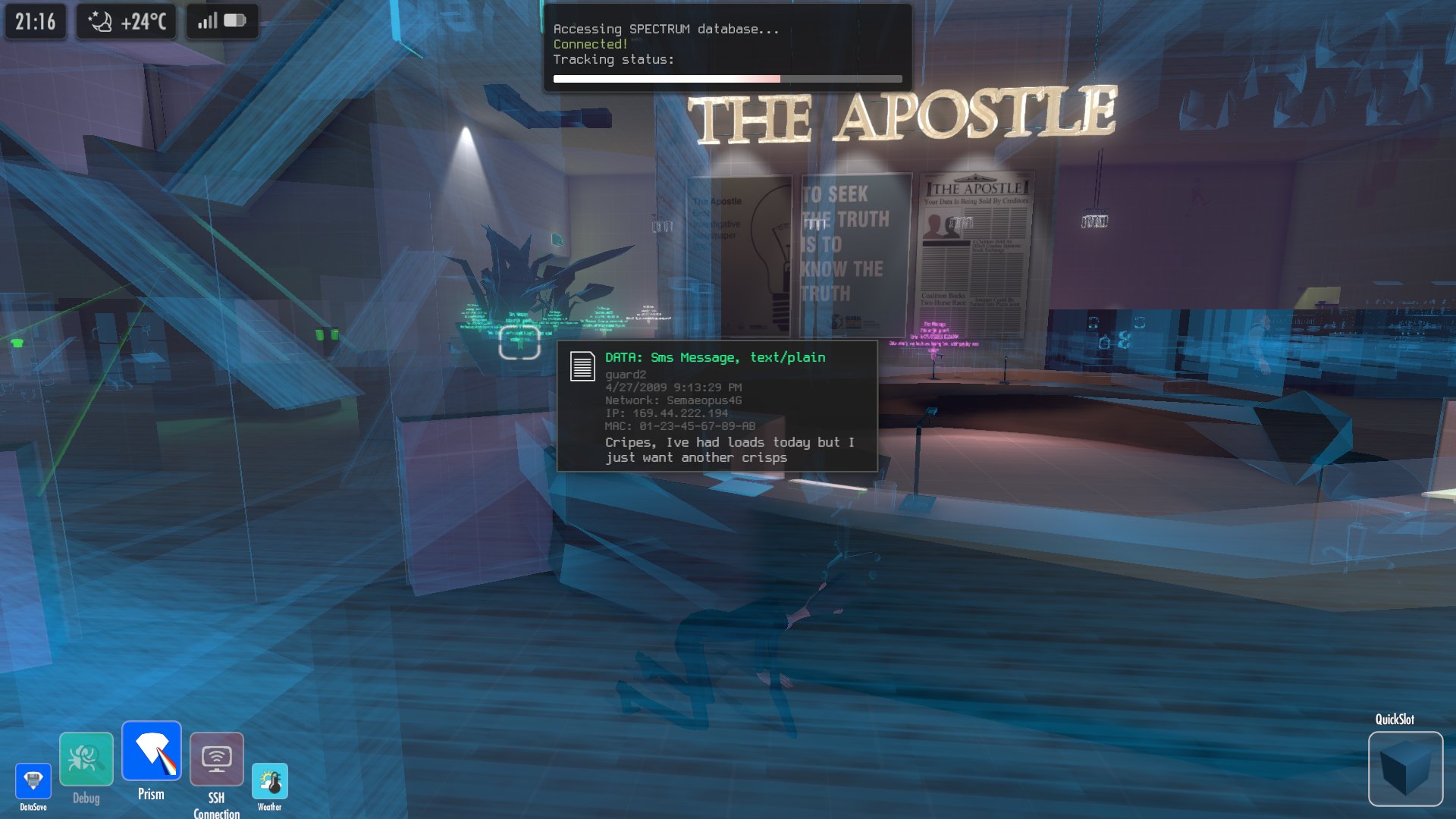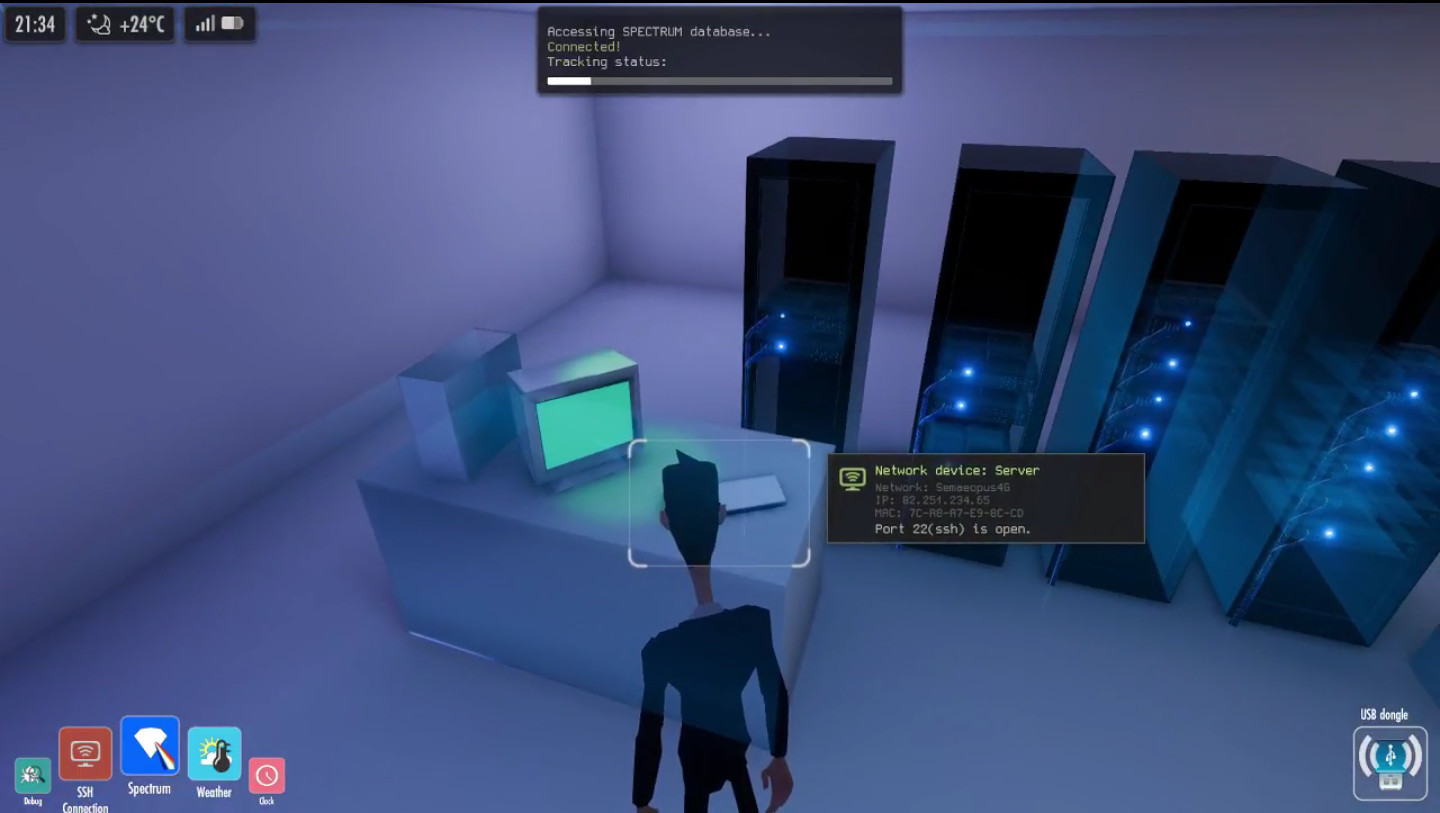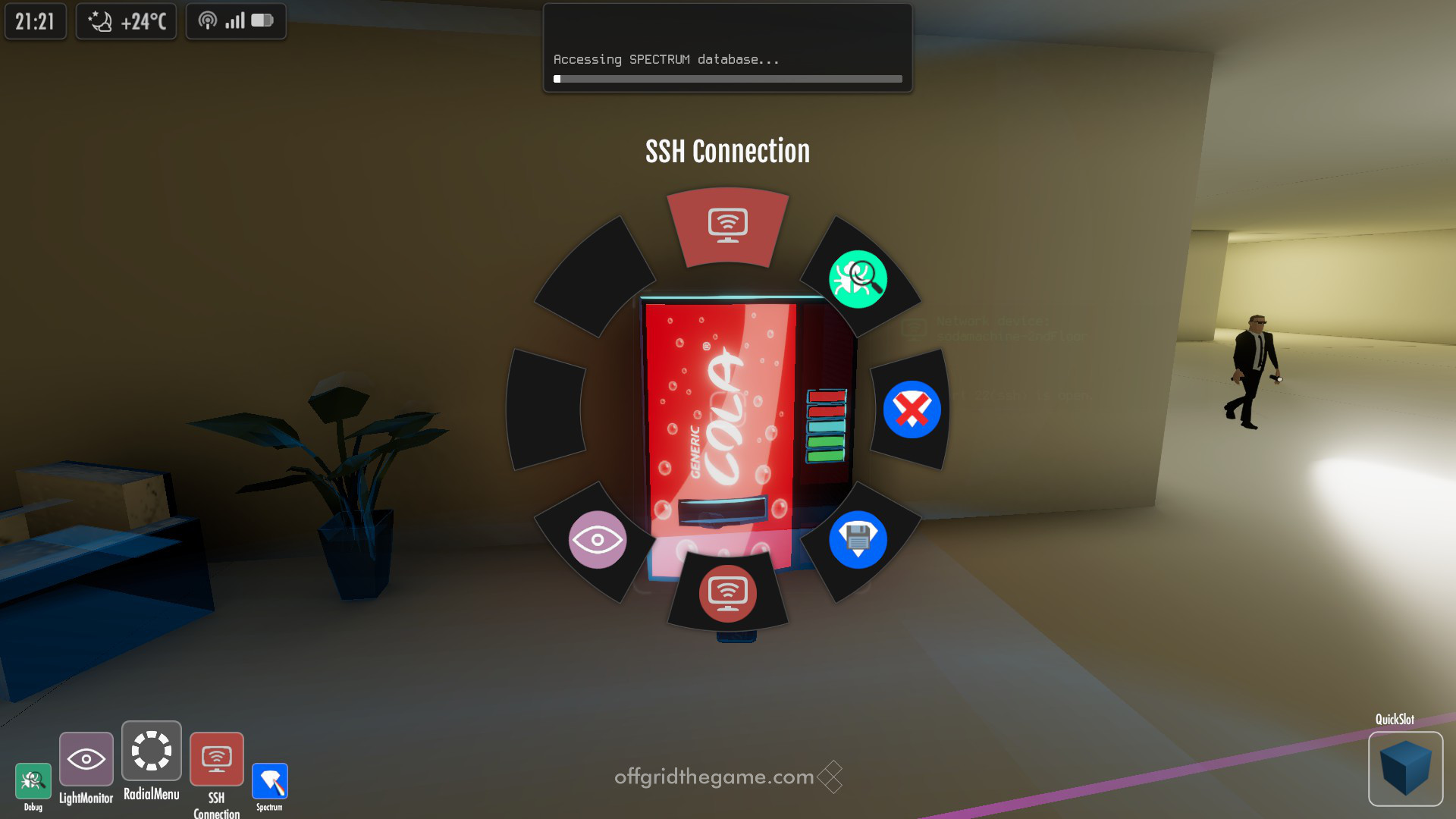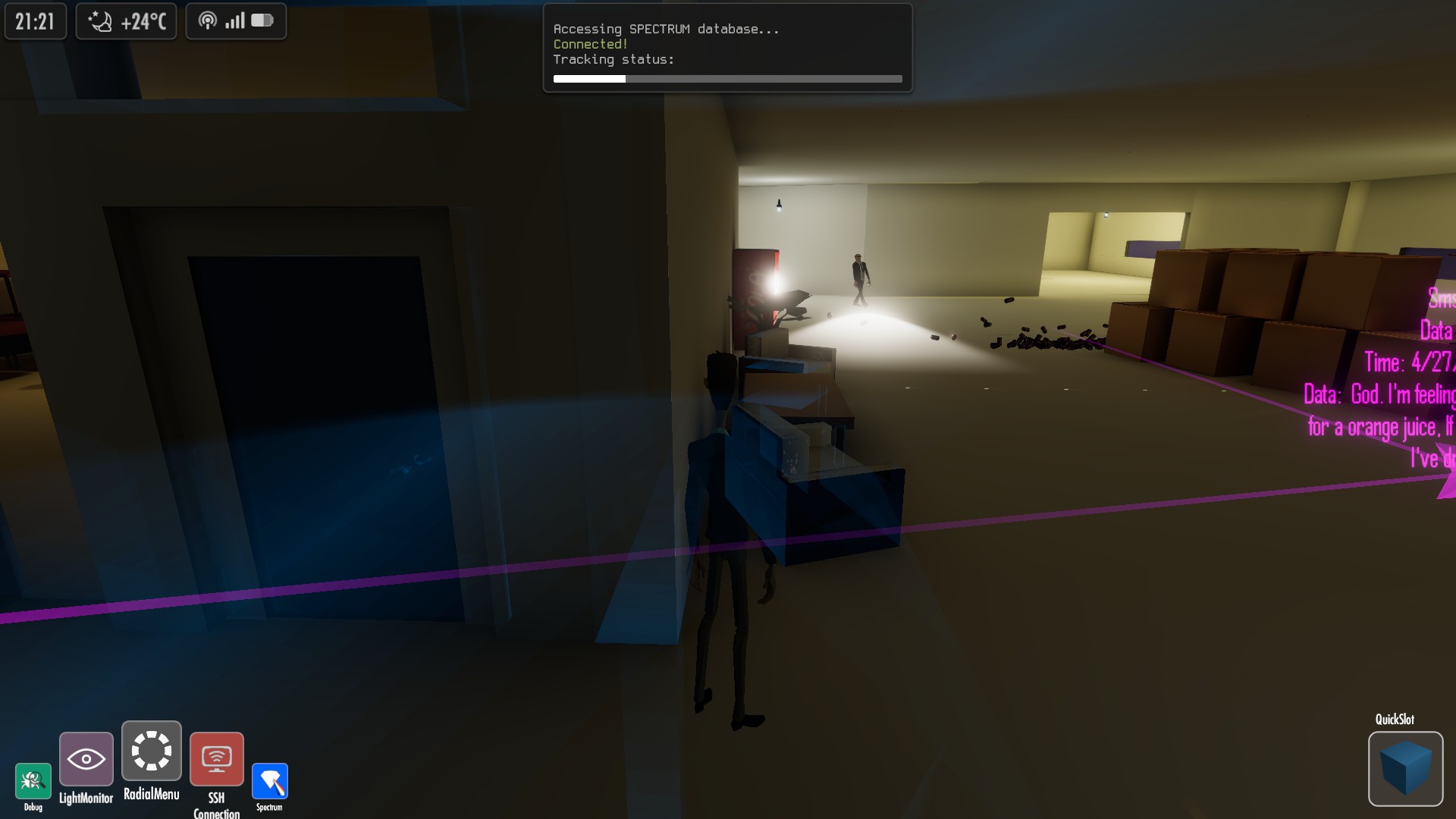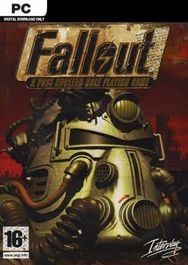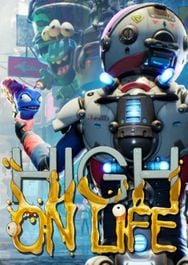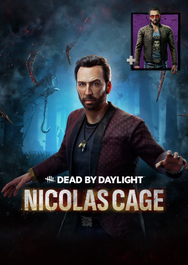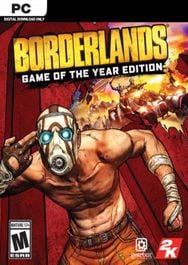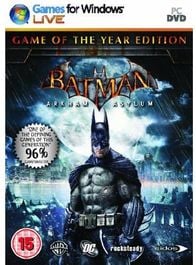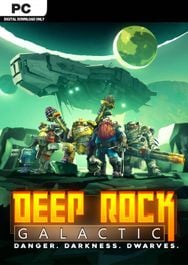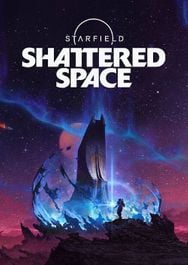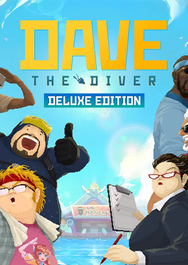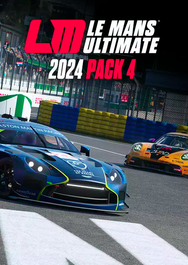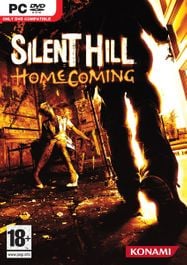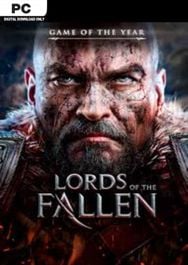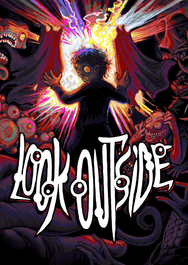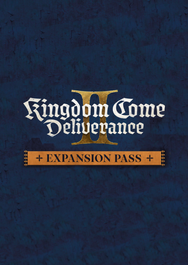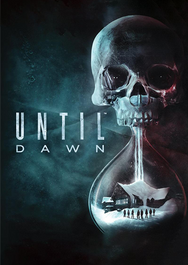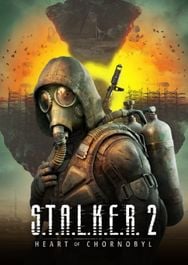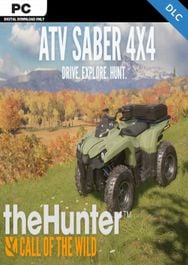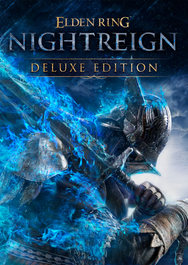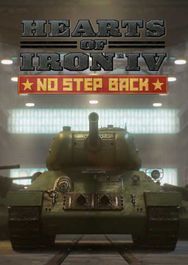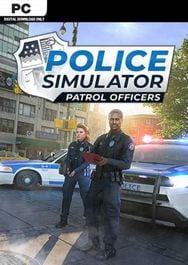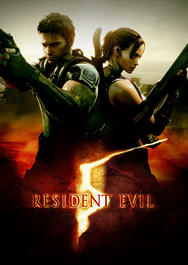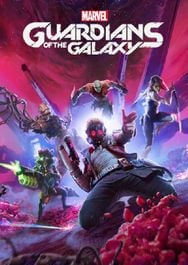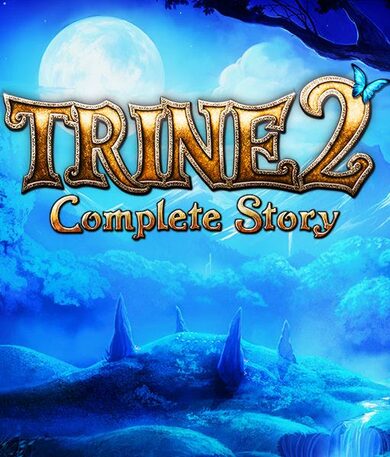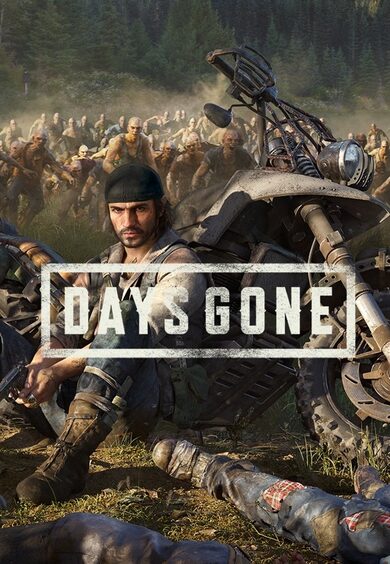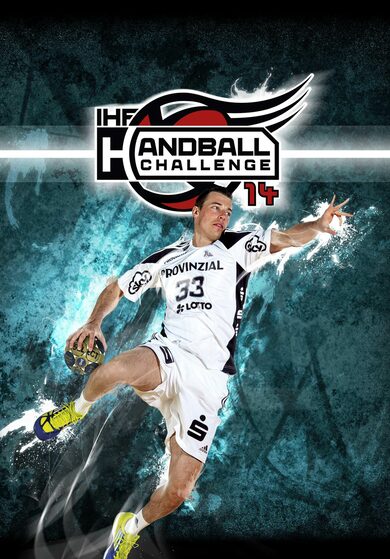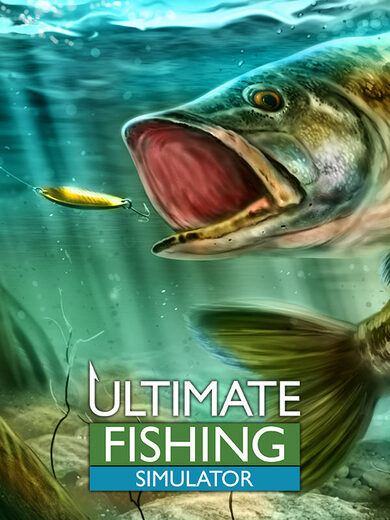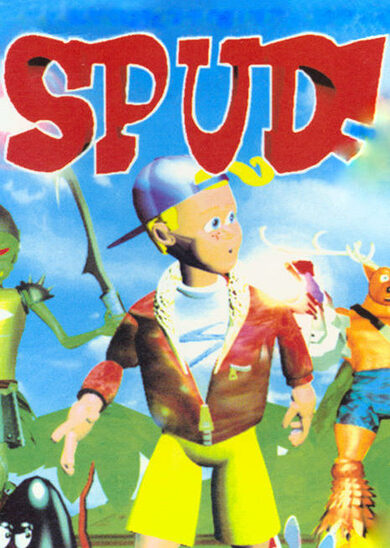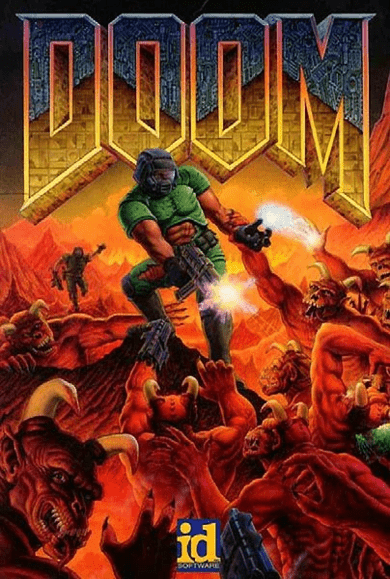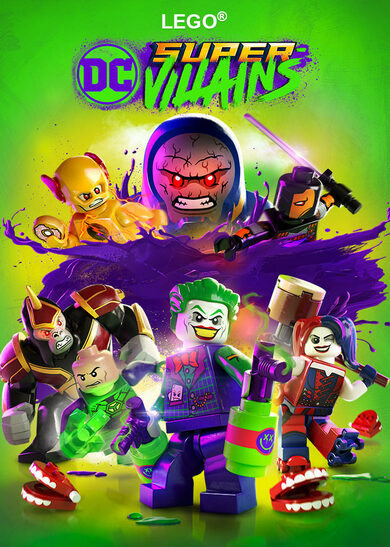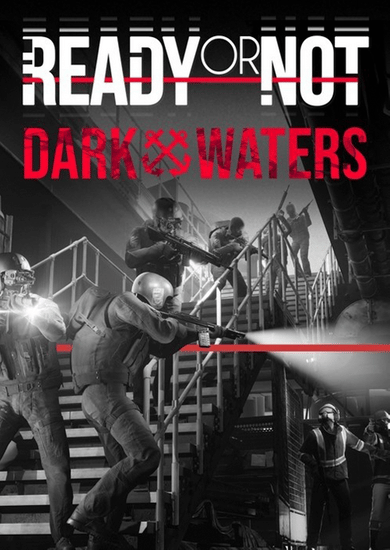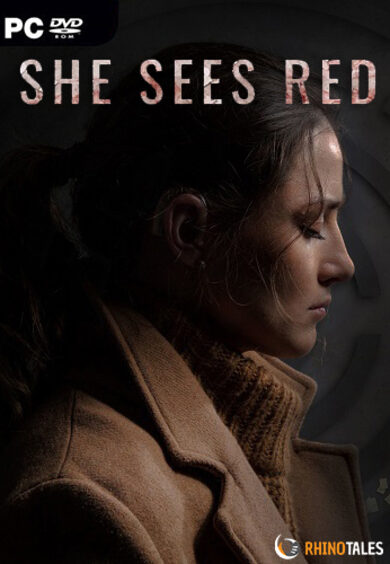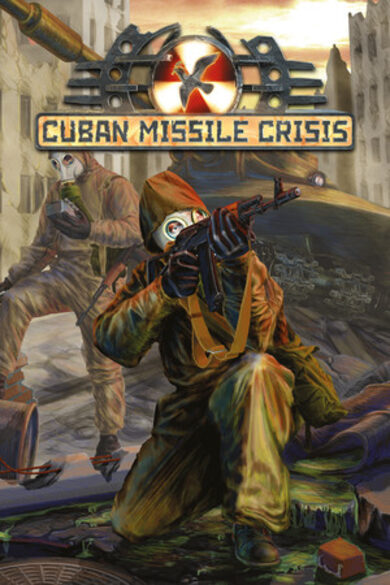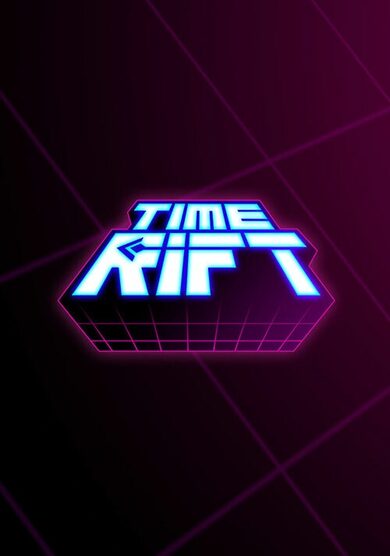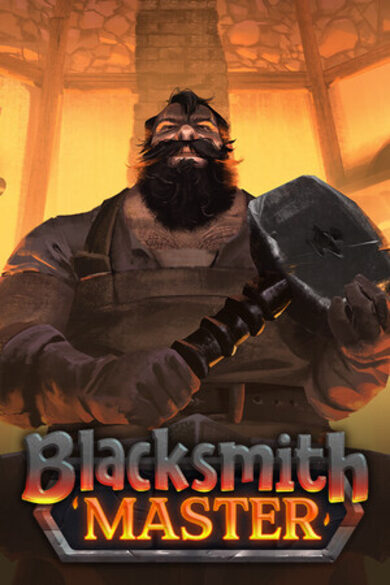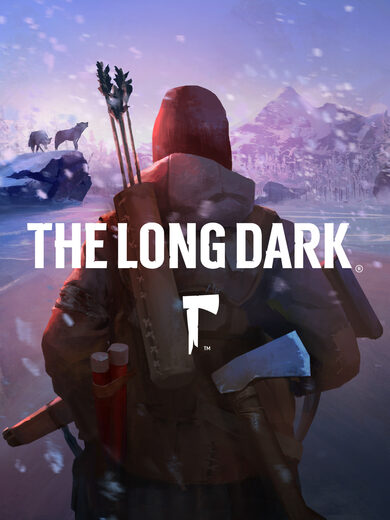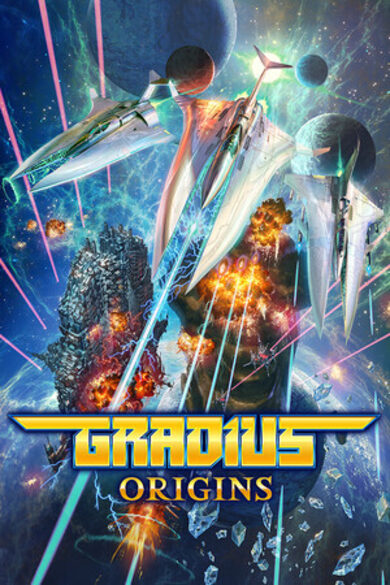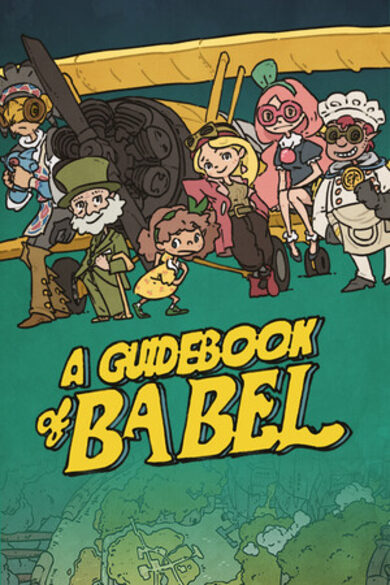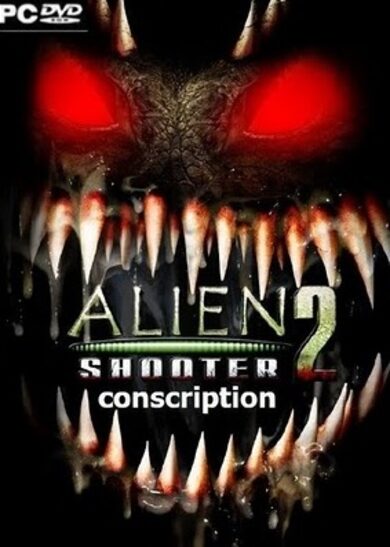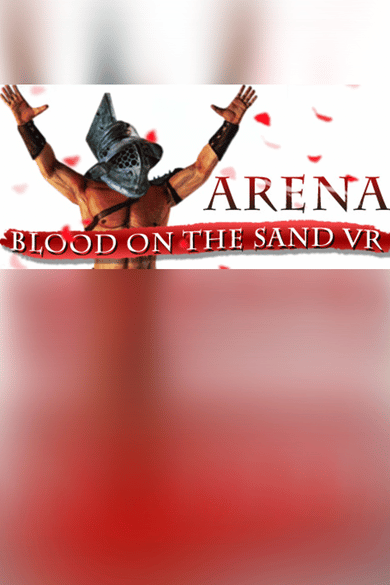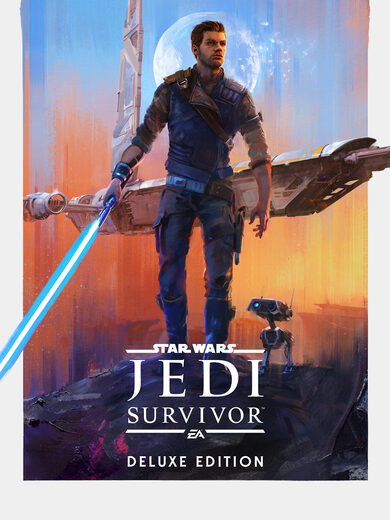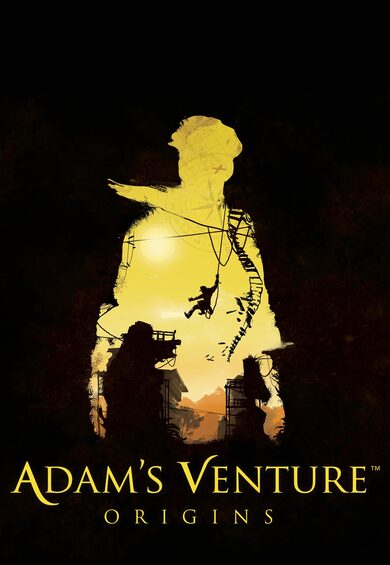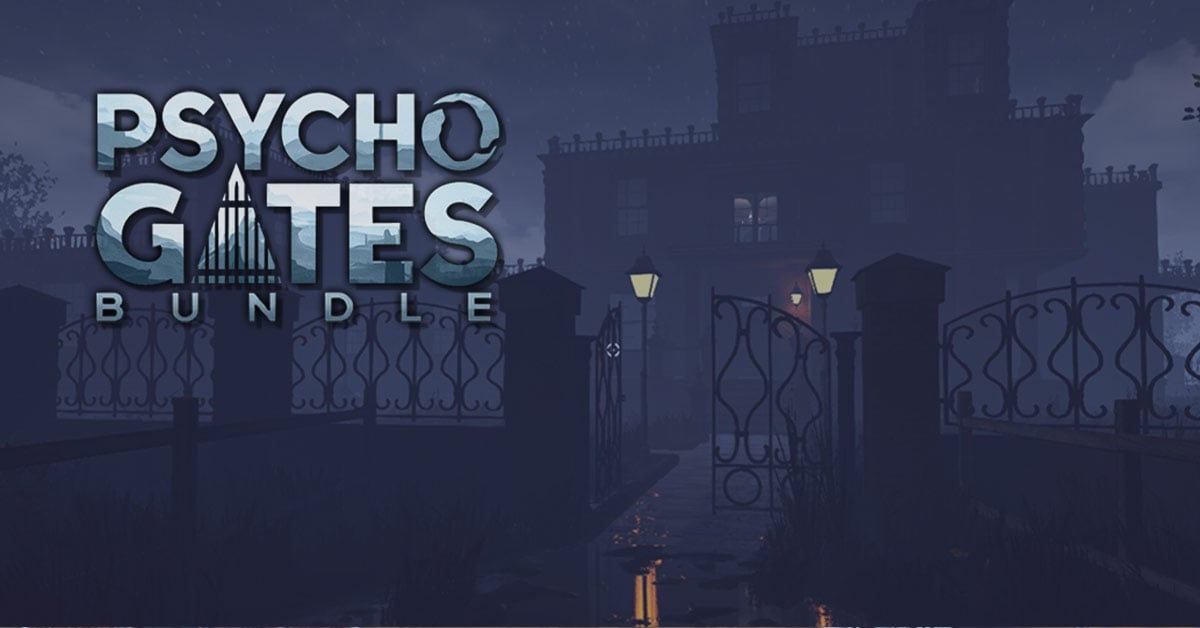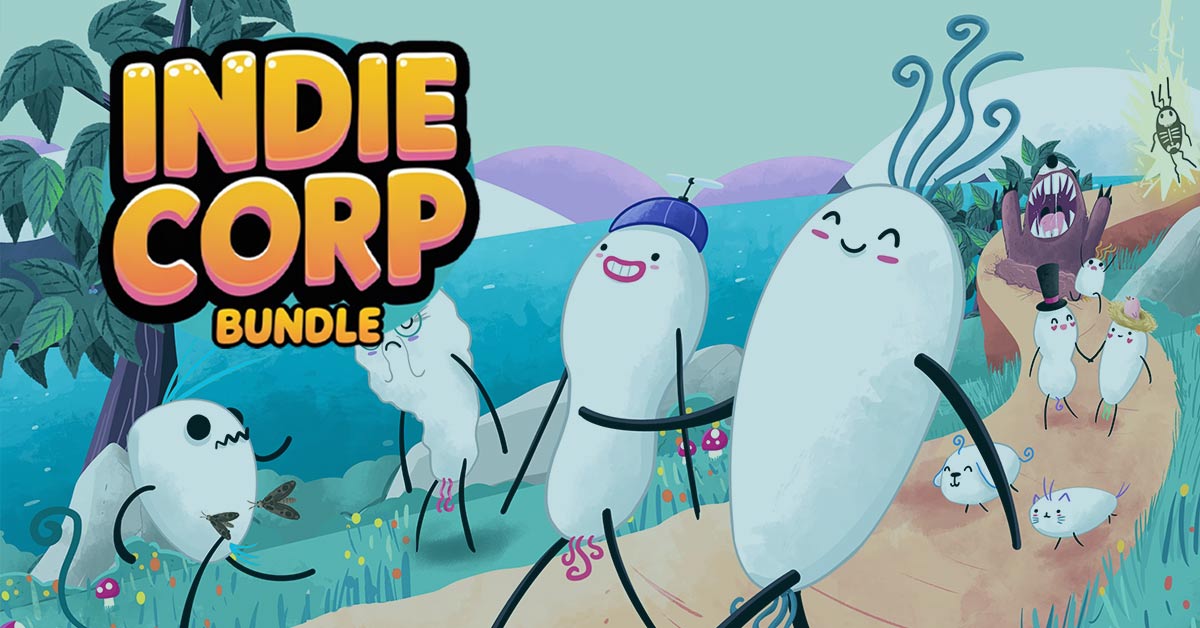Off Grid is a 3rd person stealth hacking game where data is your most powerful weapon. Off Grid forgoes combat for hacking tools and ingenuity, and is completely moddable.
Gameplay utilises unique mechanics that allow you to manipulate the world and people around you with the data they unwittingly leave behind. It’s a stealth game where the player can truly hack and manipulate objects in the environment.
Players, modders, and hackers will be able to use the game to create new and interesting levels with stories about surveillance, hacking and the internet of things.
Gameplay utilises unique mechanics that allow you to manipulate the world and people around you with the data they unwittingly leave behind. It’s a stealth game where the player can truly hack and manipulate objects in the environment.
Players, modders, and hackers will be able to use the game to create new and interesting levels with stories about surveillance, hacking and the internet of things.
Features:
- Stealth and hacking gameplay based on use of data and environments rather than weapons and combat
- Hack into lifelike simulated networks and data with realistic hacking techniques and tools including SSH, sidejacking, and social engineering of the AI
- Contemporary storyline and missions related to real-world events surrounding data privacy and mass surveillance
- Fully moddable content encouraging players to create new and interesting levels, whether complete fantasy or mimicking hacking in the real world around them
- Outstanding audio and original soundtrack from Jonas Jensen and Lyndon Holland, the BAFTA-winning composer from the game Virginia
Sprint Roundup: Spring Forward
On the last sprint roundup we mentioned that we started to work in some improvements in the AI to give more flexibility to the NPCs. So what exactly are these improvements? To start, some bugs were fixed, some unused features were removed and others simplified. But the main thing improved was the possibility to change, add or remove any aspect of the NPC behaviour in run time, like, for example, actions and goals, and with this came a round of improvements on our AI debugging tool, the AI Explorer:

The default way to change any NPC behaviour is still as it has always been, changing the world states. Only in specific situations should changing the goals or actions be needed, but this is now possible by adding or removing them during runtime and allows for much more complex behaviour. Changing Goals should be used rarely, as it is seen as a more permanent change to the NPC behaviour.
It's important to keep the following concepts in mind to understand the best way to change an NPC behaviour:
"World States" represent everything that the NPC knows about the world and themselves, for example: The guard must see the intruder before doing any action to try to catch it. Changing world states in order to evoke a reaction is the first thing you do.
"Actions" are the available skills and resources that an NPC has, for example: A guard should have an action to use a taser or other resource to knock out the intruder, and so accomplishing his goal. Changing actions is the best way to change what an NPC has the potential to do.
"Goals" describe the intentions or beliefs of the NPC, for example: the guard should always have the goal to catch the intruder, because it's his job, if this goal is removed it means that the guard lost his faith or belief in the job. For this reason goals are the last thing in NPC behavior you would consider changing as you are fundamentally changing them as a person.
Being able to alter any of these at runtime means NPCs are now more flexible and give more options to design new levels and scenarios, that is noted especially during the gameplay because now its possible to change its behaviour at any time and you don't have any restrictions in relation to what was initially defined in the NPC, so that means that a NPC now can use picked up objects, learn new skills, change their main objective, among other possibilities, it really is much,much more flexibility.
But of course this flexibility also means that is important to be careful with the complexity of the NPC definition, it could get a bit confusing in the best way to accomplishing some results and also could be hard to track why the NPC is behaving in some way. So to simplify we think the best way to approach the changing in the NPC behaviour in runtime is trying to change the world states first (but being careful to not have to many different states), next is the actions (that are especially handy for use specific items and skills), and the last one is the goals (that need to be used very carefully because a minor change can change the NPC behaviour drastically). Hopefully this model will provide some exciting opportunities for us in design and for modders too!
We also replaced the old Lua API call for altering a character's motivation value with a new generic system which allows for checking, and setting, any of the stats an AI might have.
Since the last blog post, we've spent some time fixing some usability issues on the UI side. Mainly, we've added automatic scrolling to UI for use with gamepad controls, removing the need to use scrollbars, which then simplifies the navigation across the UI. To go with that, we've updated lots of the UI across the game, also fixing some selection issues and improving on the mouse cursor autohide system to further smooth the controls and especially switching between input methods. While these might not sound like big changes, they certainly have made the user experience a lot smoother...

The start of a new year always brings a lot of paperwork, with our financial year end timing in to the calendar one. It's a lot of shifting numbers on spreadsheets but the nice thing is that in the UK, with the fantastic BFI's support, we actually get a credit back on money we have spent on development each year though the Video Games Tax Relief scheme the UK government runs. Pretty good stuff.
We have had some work for hire that we have fitted in in a couple of places, Pontus has been doing research and development on an unannounced project of a developer friend of ours and Rich ran a lecture series on Blender basics and specializing in Character animation for the MA Character Animation course at Central Saint Martins, University of The Arts London.
We also managed to garner some more funding for some R&D work from one of our long term partners Creative England, which has been super exciting - PLEASE don't jump to any conclusions from this but we have been researching how well our procedural message generation can be evolved to be able to handle languages other than English...
As mentioned above, we have been working out how our generated content will work in different languages and doing some R&D on non-latin alphabet/writing system support. This is all quite exciting stuff, and warrants its own dedicated post at some point, but... essentially, OFF GRID's game mechanics depend on key words in data and meta-data generated by NPCs, and the fact that there is text in the game that is generated at all creates and interesting problem to solve when it comes to localisation.

At this early stage we can't specify any particular languages, in-fact we can't guarantee it will work, or that there will be any other languages than English in the game, but we are laying the groundwork to see if possible and have embarked on some research work to see what those possibilities are, watch this space!
Some of you who have played alpha builds, or demos at some point may have seen the intro cutscene to the game (it's the one that some of the clips in the trailer on our Steam page come from). One of the things we have been working on is making this part playable and more of a mix of small cutscene sections intertwined with basic tutorials and gameplay. We are believers in making sure that everything in the game story is told via gameplay and the environment as much as possible, so we were keen to make sure that the very beginning of the game sets the scene while still adhering to this principle.

Unity's Timeline is the powerful tool we have been using to achieve this, but we have had to do some real hackery to get it to play nice with interactive sections rather surprisingly. When you couple that with tying it into our lua commands for writing missions, objectives and triggers and you start to get quite a complex section of the game to assemble. It's coming along nicely though, and they say the first 30 seconds, and 30 minutes of a game are the most important to focus on to keep players intrigued, so we have been happily dedicating a lot of time to getting this to all feel right. It's also certainly something we'll be counting on you, as our players, to play and give feedback on ahead of full release. Looking forward to seeing what you think!

We've also been fine tuning and cleaning up some of the content in the later game and making some more complex puzzles and hacks. The weird thing about editing content is sometimes you can make more of something, in this instance we needed to make sense of one of the final missions, and actually breaking it into two separate missions works better. Without giving any spoilers, one of the planned missions is now giving a 2-for-1 value!
[u]Content (Level Design and Art)[/u]
[u]AI[/u]
Lua support for Unity timeline and firing Lua functions from it (use wisely!)[/*] Lua Console app for testing any line of lua anywhere in the game
[/*] [/list][u]Bugs fixed[/u]
[u]Other[/u]
Hopefully that catches you up on OFF GRID development. It's been a tough 2020 for us, especially the second half of it. Safe to say, the world has been turned upside down and that had an impact on some of our families and how we managed running businesses and looking after our loved ones. Obviously OFF GRID is continuing development but running behind at this point, luckily we have at every turn been ahead of the punches and come up with game plans to make sure we could continue sustainably, and deliver OFF GRID come what may.
For our little studio this has meant tightening our belts at the couple of junctures when we have found we were behind our anticipated milestones, tightening scope, bringing in some part time work-for-hire contracts to top up the coffers, and scaling the team down so we could operate in a lean and efficient way. The knock-on effect of shrinking the team for sustainability is it means things take longer, but it has the benefit of meaning you can roll with the punches and survive more easily.
The three of us, Pontus, Andre, and Rich are still working hard on dev, bringing you the best game possible, and one thing is clear, with our great little team, OFF GRID is going to be everything it deserves to be, and that you deserve it to be for supporting us. Thank you so much and looking forward to showing you more over the coming months!
If you havent already - be sure to wishlist Off Grid on Steam - each wishlist makes a big difference to us, and we really appreciate your support!
Welcome Folks and Happy 2021, and how good does it feel to be finally well out of 2020?!
Thanks for bearing with us while we got this you, we missed December's update, but here we are, back in the swing of things, and so finally here is your back-to-regular dev update!
Give me an 'A', give me an 'I', what does that Spell?!
On the last sprint roundup we mentioned that we started to work in some improvements in the AI to give more flexibility to the NPCs. So what exactly are these improvements? To start, some bugs were fixed, some unused features were removed and others simplified. But the main thing improved was the possibility to change, add or remove any aspect of the NPC behaviour in run time, like, for example, actions and goals, and with this came a round of improvements on our AI debugging tool, the AI Explorer:

The default way to change any NPC behaviour is still as it has always been, changing the world states. Only in specific situations should changing the goals or actions be needed, but this is now possible by adding or removing them during runtime and allows for much more complex behaviour. Changing Goals should be used rarely, as it is seen as a more permanent change to the NPC behaviour.
It's important to keep the following concepts in mind to understand the best way to change an NPC behaviour:
"World States" represent everything that the NPC knows about the world and themselves, for example: The guard must see the intruder before doing any action to try to catch it. Changing world states in order to evoke a reaction is the first thing you do.
"Actions" are the available skills and resources that an NPC has, for example: A guard should have an action to use a taser or other resource to knock out the intruder, and so accomplishing his goal. Changing actions is the best way to change what an NPC has the potential to do.
"Goals" describe the intentions or beliefs of the NPC, for example: the guard should always have the goal to catch the intruder, because it's his job, if this goal is removed it means that the guard lost his faith or belief in the job. For this reason goals are the last thing in NPC behavior you would consider changing as you are fundamentally changing them as a person.
Being able to alter any of these at runtime means NPCs are now more flexible and give more options to design new levels and scenarios, that is noted especially during the gameplay because now its possible to change its behaviour at any time and you don't have any restrictions in relation to what was initially defined in the NPC, so that means that a NPC now can use picked up objects, learn new skills, change their main objective, among other possibilities, it really is much,much more flexibility.
But of course this flexibility also means that is important to be careful with the complexity of the NPC definition, it could get a bit confusing in the best way to accomplishing some results and also could be hard to track why the NPC is behaving in some way. So to simplify we think the best way to approach the changing in the NPC behaviour in runtime is trying to change the world states first (but being careful to not have to many different states), next is the actions (that are especially handy for use specific items and skills), and the last one is the goals (that need to be used very carefully because a minor change can change the NPC behaviour drastically). Hopefully this model will provide some exciting opportunities for us in design and for modders too!
We also replaced the old Lua API call for altering a character's motivation value with a new generic system which allows for checking, and setting, any of the stats an AI might have.
The U in Usablility
Since the last blog post, we've spent some time fixing some usability issues on the UI side. Mainly, we've added automatic scrolling to UI for use with gamepad controls, removing the need to use scrollbars, which then simplifies the navigation across the UI. To go with that, we've updated lots of the UI across the game, also fixing some selection issues and improving on the mouse cursor autohide system to further smooth the controls and especially switching between input methods. While these might not sound like big changes, they certainly have made the user experience a lot smoother...

Paperwork for a good cause!
The start of a new year always brings a lot of paperwork, with our financial year end timing in to the calendar one. It's a lot of shifting numbers on spreadsheets but the nice thing is that in the UK, with the fantastic BFI's support, we actually get a credit back on money we have spent on development each year though the Video Games Tax Relief scheme the UK government runs. Pretty good stuff.
We have had some work for hire that we have fitted in in a couple of places, Pontus has been doing research and development on an unannounced project of a developer friend of ours and Rich ran a lecture series on Blender basics and specializing in Character animation for the MA Character Animation course at Central Saint Martins, University of The Arts London.
We also managed to garner some more funding for some R&D work from one of our long term partners Creative England, which has been super exciting - PLEASE don't jump to any conclusions from this but we have been researching how well our procedural message generation can be evolved to be able to handle languages other than English...
No Tofu!
As mentioned above, we have been working out how our generated content will work in different languages and doing some R&D on non-latin alphabet/writing system support. This is all quite exciting stuff, and warrants its own dedicated post at some point, but... essentially, OFF GRID's game mechanics depend on key words in data and meta-data generated by NPCs, and the fact that there is text in the game that is generated at all creates and interesting problem to solve when it comes to localisation.

At this early stage we can't specify any particular languages, in-fact we can't guarantee it will work, or that there will be any other languages than English in the game, but we are laying the groundwork to see if possible and have embarked on some research work to see what those possibilities are, watch this space!
The Beginning and The End
Some of you who have played alpha builds, or demos at some point may have seen the intro cutscene to the game (it's the one that some of the clips in the trailer on our Steam page come from). One of the things we have been working on is making this part playable and more of a mix of small cutscene sections intertwined with basic tutorials and gameplay. We are believers in making sure that everything in the game story is told via gameplay and the environment as much as possible, so we were keen to make sure that the very beginning of the game sets the scene while still adhering to this principle.

Unity's Timeline is the powerful tool we have been using to achieve this, but we have had to do some real hackery to get it to play nice with interactive sections rather surprisingly. When you couple that with tying it into our lua commands for writing missions, objectives and triggers and you start to get quite a complex section of the game to assemble. It's coming along nicely though, and they say the first 30 seconds, and 30 minutes of a game are the most important to focus on to keep players intrigued, so we have been happily dedicating a lot of time to getting this to all feel right. It's also certainly something we'll be counting on you, as our players, to play and give feedback on ahead of full release. Looking forward to seeing what you think!

We've also been fine tuning and cleaning up some of the content in the later game and making some more complex puzzles and hacks. The weird thing about editing content is sometimes you can make more of something, in this instance we needed to make sense of one of the final missions, and actually breaking it into two separate missions works better. Without giving any spoilers, one of the planned missions is now giving a 2-for-1 value!
Changelist
[u]Content (Level Design and Art)[/u]
- Design for the Harbour level passenger terminal / offices building[/*]
- Replaced messages that were written for old SMS system with proper single-message conversations[/*]
- Courthouse initial puzzles done[/*]
- Taking the scene from prototype to production and playable instead of just a cutscene[/*]
- Broke up Court House Level into two levels[/*]
- Autoscrolling in UI[/*][list]
- Usability improvements especially on a gamepad for any scrolling UI[/*]
- Greatly improves device UIs since it means we can make their scrollbars un-selectable on a gamepad, simplifying the navigation in that window[/*]
[u]AI[/u]
- AI Goal and Action improvements for flexibility[/*]
- AI Debug system improved (with more information and in a clear format)[/*]
- Lua API support for setting/getting NPC AI stat values[/*][list]
- We used to have AI.AlterNPCMotivation(name, value) specifically for setting motivation stat value, this replaces it with a generic AI.AlterNPCStat(name, stat, value) usable for all the stats an AI might have[/*]
[/*]
- Bug fixes related with the AI and save system [/*]
- Fixed issues with mouse cursor autohide/show system when switching between mouse/kb and gamepad controls[/*]
[u]Other[/u]
- Year end accounts and VGTR
[/*] - A few small work-for-hire jobs [/*]
- Blender for Animators Lectures[/*]
- New Ideas Fund application and grant[/*]
Hopefully that catches you up on OFF GRID development. It's been a tough 2020 for us, especially the second half of it. Safe to say, the world has been turned upside down and that had an impact on some of our families and how we managed running businesses and looking after our loved ones. Obviously OFF GRID is continuing development but running behind at this point, luckily we have at every turn been ahead of the punches and come up with game plans to make sure we could continue sustainably, and deliver OFF GRID come what may.
For our little studio this has meant tightening our belts at the couple of junctures when we have found we were behind our anticipated milestones, tightening scope, bringing in some part time work-for-hire contracts to top up the coffers, and scaling the team down so we could operate in a lean and efficient way. The knock-on effect of shrinking the team for sustainability is it means things take longer, but it has the benefit of meaning you can roll with the punches and survive more easily.
The three of us, Pontus, Andre, and Rich are still working hard on dev, bringing you the best game possible, and one thing is clear, with our great little team, OFF GRID is going to be everything it deserves to be, and that you deserve it to be for supporting us. Thank you so much and looking forward to showing you more over the coming months!
If you havent already - be sure to wishlist Off Grid on Steam - each wishlist makes a big difference to us, and we really appreciate your support!
[ 2021-03-09 19:49:53 CET ] [Original Post]
Minimum Setup
- OS: Ubuntu 16.4 or equivalent
- Processor: Intel Core i5 2300 or AMD FX6120Memory: 6 GB RAM
- Memory: 6 GB RAM
- Graphics: GeForce GTX 550 Ti or Radeon HD 6770
- Storage: 10 GB available space
Recommended Setup
- OS: RISC architecture is gonna change everything
- Processor: P6 chip. Triple the speed of the Pentium
- Graphics: 3Dfx Voodoo capable GFX cardSound Card: The Sound Blaster 1.0 ( "Killer Kard")Additional Notes: 28.8 KBPS Modem
GAMEBILLET
[ 6355 ]
FANATICAL
[ 6588 ]
GAMERSGATE
[ 3177 ]
MacGameStore
[ 2532 ]
INDIEGALA
[ 1655 ]
LOADED
[ 1040 ]
ENEBA
[ 32822 ]
Green Man Gaming Deals
[ 867 ]
AllKeyShop
[ 45629 ]
YUPLAY
[ 6040 ]
Gamivo
[ 17235 ]
HUMBLE
[ 819 ]
FANATICAL BUNDLES
GMG BUNDLES
HUMBLE BUNDLES
INDIEGALA BUNDLES
by buying games/dlcs from affiliate links you are supporting tuxDB

